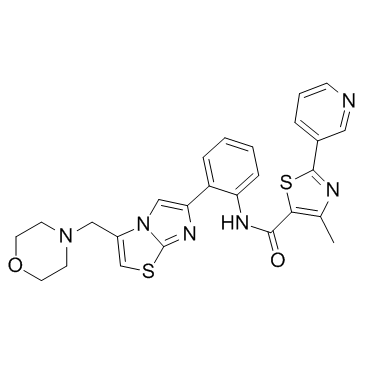1093403-33-8
| Name | 4-methyl-N-[2-[3-(morpholin-4-ylmethyl)imidazo[2,1-b][1,3]thiazol-6-yl]phenyl]-2-pyridin-3-yl-1,3-thiazole-5-carboxamide$ |
|---|---|
| Synonyms |
4-methyl-N-(2-(3-(morpholinomethyl)imidazo[2,1-b]thiazol-6-yl)phenyl)-2-(pyridin-3-yl)thiazole-5-carboxamide
CS-0955 5-Thiazolecarboxamide, 4-methyl-N-[2-[3-(4-morpholinylmethyl)imidazo[2,1-b]thiazol-6-yl]phenyl]-2-(3-pyridinyl)- 5-Thiazolecarboxamide,4-methyl-N-[2-[3-(4-morpholinylmethyl)imidazo[2,1-b]thiazol-6-yl]phenyl]-2-(3-pyridinyl) 4-Methyl-N-{2-[3-(4-morpholinylmethyl)imidazo[2,1-b][1,3]thiazol-6-yl]phenyl}-2-(3-pyridinyl)-1,3-thiazole-5-carboxamide sirtuin modulator SRT 2104 GSK2245840 SRT-2104 |
| Description | SRT 2104 is a brain-permeable activator of SIRT1, used for the research of type 2 diabetes mellitus and Huntington's disease. |
|---|---|
| Related Catalog | |
| Target |
SIRT1 |
| In Vitro | SRT 2104 (3 μM) reduces p65/RelA acetylation levels in C2C12 cells[1]. |
| In Vivo | SRT2104 (100 mg/kg, p.o.) improves whole-body physiology and extends lifespan in mice fed a standard diet. SRT2104 increases mitochondrial content and suppresses the inflammatory response in SD-fed mice. SRT2104 also changes the gene expression profile differently in liver and muscle. Short-term SRT2104 preserves muscle and bone mass[1]. 0.5% SRT2104 diet penetrates the blood-brain barrier, attenuates brain atrophy, improves motor function, and extends survival in a mouse model of Huntington's disease[2]. |
| Cell Assay | C2C12 cell line is cultured in low glucose Dulbecco’s modified Eagle’s medium (DMEM) supplemented with 10% fetal bovine serum (FBS) and penicillin-streptomycin. Cells are treated with vehicle (0.1% DMSO) or 3 μm SRT2104 for 24 h and then harvested for protein and Western blotting[1]. |
| Animal Admin | For the longevity study, diets are started at 28 weeks of age after randomization into two groups of 100 mice per group. Mice are fed a standard AIN-93G diet (SD; carbohydrate:protein:fat ratio of 64:19:17 percent of kcal), or a SD supplemented with SRT2104. SRT2104 is added at a dose of 1.33 g drug per kg of chow, formulated to provide daily doses of 100 mg drug/kg bodyweight. For the hindlimb suspension study, starting at 4 months of age, C57BL/6 mice are fed either a standard AIN-93G diet (SD; carbohydrate:protein:fat ratio of 64:19:17 percent of kcal) or a SD supplemented with SRT2104 for 4 weeks prior to suspension, and then for an additional 2 weeks during the suspension. Diets are formulated so mice receive a daily dose of 200 mg drug/kg of bodyweight. For the 48-h fasting study, mice are fed either SD or a SD supplemented with SRT2104 (100 mg/kg) for 6 weeks prior to sacrifice. This is the same diet as for the longevity study mice. For the whole-body SIRT1 knockout and muscle-specific SIRT1 knockout mouse models, mice are maintained on house chow (carbohydrate:protein:fat ratio of 58:24:18 percent of kcal) for the course of their lives[1]. |
| References |
| Density | 1.5±0.1 g/cm3 |
|---|---|
| Molecular Formula | C26H24N6O2S2 |
| Molecular Weight | 516.638 |
| Exact Mass | 516.140198 |
| PSA | 144.62000 |
| LogP | 4.10 |
| Index of Refraction | 1.761 |
| Storage condition | -20℃ |
